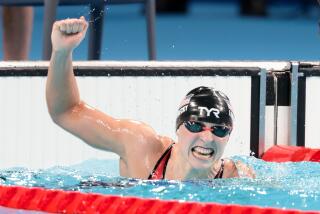Klecker Passes With Straight A’s : Olympic trials: She goes in front in last mile and leads O’Brien, Larrieu Smith onto U.S. team for Barcelona.
- Share via
HOUSTON — Marathons are a puzzling and often poignant undertaking. For their duration, runners attempt to assess the weather or the competition or a course. But it is they who are ultimately measured.
Three women best withstood the race’s 26-mile 385-yard test Sunday and joined the 1992 U.S. Olympic team. Through it, each revealed a truth about herself:
--Janis Klecker, a dentist from Minnetonka, Minn., won the women’s Olympic Marathon Trials. She silenced the criticism that said she ran too many marathons each year, and that her husband, who coaches her, wasn’t training her properly. Klecker showed faith and constancy.
--Cathy O’Brien, the running prodigy who became an Olympian at 20, was second. O’Brien led much of the marathon. But when Klecker fell on slippery pavement at a water station 15 miles into the race, O’Brien stopped, ran back and helped Klecker to her feet. O’Brien showed compassion and humility.
--Francie Larrieu Smith was third and made her fifth Olympic team at 39. Smith was representing the United States in international competition when O’Brien was 1. At the end of Sunday’s race through the rainy streets of Houston, there was Larrieu Smith, safely in third and assured of an Olympic berth, still running hard after all these years.
For another runner, the race was also a trial--a once-every-four-years agony. Lisa Weidenbach,a pre-race favorite to make the team, finished fourth. Again.
Weidenbach had discussed her hard-luck story with reporters all week. In only her second marathon, Weidenbach was the surprise fourth-place finisher at the 1984 Olympic Trials, the first for women. In 1988, she was at the top of her form, but was passed in the last mile and missed making the Olympic team by one place. Fourth.
“Third time’s the charm,” Weidenbach sang out before the race Sunday. It was not.
Weidenbach, 30, of Issaquah, Wash., could not hang on as the first three runners pulled away.
Weidenbach was an All-American swimmer at the University of Michigan. She qualified for the Olympic swim team going to the 1980 Moscow Games, but was denied the chance to compete because of the U.S.-led boycott. Disappointed, Weidenbach retired from swimming and turned to running, where she has found success but little solace.
There could have been more unhappy stories, given Sunday’s wet and dangerous weather. Klecker’s winning time of 2 hours 30 minutes 12 seconds was respectable, given the race’s conservative and tactical history. O’Brien’s time was 2:30:26 and Larrieu Smith’s time was 2:30:39.
The race’s first casualty was Kim Jones, the fastest woman in the field. Jones was running on a broken bone in her right ankle and against her doctor’s orders. She said Friday that nothing was going to keep her out of the race. She dropped out at 3.1 miles.
“I took a chance,” Jones said. “Each step hurt. I started compensating for my ankle, and I felt it in my hip. I didn’t want to become another Joannie.”
Jones was referring to Joan Benoit Samuelson, who holds the American record of 2:21:21. Samuelson’s back problems turned into hip problems. Samuelson did not run here and is expected to run the 10,000 meters at the U.S. Olympic Track and Field Trials at New Orleans in July.
In Samuelson’s absence, the race was wide open. A pack of 15 runners settled in until the 10,000-meter mark. At that point, Nancy Ditz, who made the team in 1988, took the lead. Ditz, of Woodside, Calif., dropped out after 14 miles.
The group strung out as the race continued on its flat course in a loop around Houston. Five runners emerged as the strongest contenders: Klecker, O’Brien, Larrieu Smith, Weidenbach and Maria Trujillo. At 19 miles, Trujillo dropped back, putting Weidenbach in fourth, O’Brien in first and Larrieu Smith and Klecker battling for second.
Klecker runs while holding her elbows away from her body at a sharp angle. No matter how odd it looks, it is effective. If Klecker was supposed to be burned out after running and winning two marathons in two weeks last fall--including the Orange County Marathon in November--she didn’t look it.
In the lead, O’Brien ran the 21st mile in 5:29, the fastest mile split of the race. But Klecker had left Larrieu Smith and was gaining ground on O’Brien.
In the last mile, Klecker passed O’Brien and turned one last corner to the finish. Klecker, whose face had been impassive the entire race, broke into a wide smile. She began to cry softly as she crossed the finish line and clasped her hands above her head.
O’Brien finished next, smiling. After she crossed the line, she turned and waited for Larrieu Smith, the veteran, and they embraced and laughed and walked and smiled.
Klecker said the victory was like “an answered prayer.” Larrieu Smith, who lives in Dallas and ran the race encouraged by her fellow Texans, said she would have never believed that when she ran the 1,500 meters in the 1972 Munich Olympics, the longest race women were allowed, that she would be an Olympian again, in the marathon 20 years later.
“It’s hard for me,” Larrieu Smith said. “It’s not like for Janis. For her running a marathon is brushing her teeth.”
The dentist simply laughed.
More to Read
Go beyond the scoreboard
Get the latest on L.A.'s teams in the daily Sports Report newsletter.
You may occasionally receive promotional content from the Los Angeles Times.







